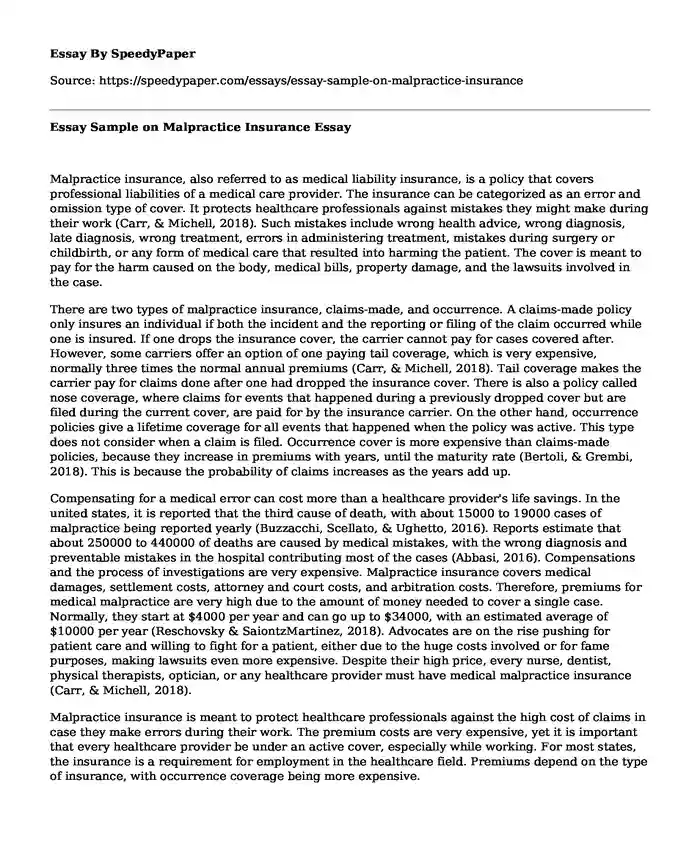
| Type of paper: | Essay |
| Categories: | Medicine Healthcare policy |
| Pages: | 3 |
| Wordcount: | 702 words |
Malpractice insurance, also referred to as medical liability insurance, is a policy that covers professional liabilities of a medical care provider. The insurance can be categorized as an error and omission type of cover. It protects healthcare professionals against mistakes they might make during their work (Carr, & Michell, 2018). Such mistakes include wrong health advice, wrong diagnosis, late diagnosis, wrong treatment, errors in administering treatment, mistakes during surgery or childbirth, or any form of medical care that resulted into harming the patient. The cover is meant to pay for the harm caused on the body, medical bills, property damage, and the lawsuits involved in the case.
There are two types of malpractice insurance, claims-made, and occurrence. A claims-made policy only insures an individual if both the incident and the reporting or filing of the claim occurred while one is insured. If one drops the insurance cover, the carrier cannot pay for cases covered after. However, some carriers offer an option of one paying tail coverage, which is very expensive, normally three times the normal annual premiums (Carr, & Michell, 2018). Tail coverage makes the carrier pay for claims done after one had dropped the insurance cover. There is also a policy called nose coverage, where claims for events that happened during a previously dropped cover but are filed during the current cover, are paid for by the insurance carrier. On the other hand, occurrence policies give a lifetime coverage for all events that happened when the policy was active. This type does not consider when a claim is filed. Occurrence cover is more expensive than claims-made policies, because they increase in premiums with years, until the maturity rate (Bertoli, & Grembi, 2018). This is because the probability of claims increases as the years add up.
Compensating for a medical error can cost more than a healthcare provider's life savings. In the united states, it is reported that the third cause of death, with about 15000 to 19000 cases of malpractice being reported yearly (Buzzacchi, Scellato, & Ughetto, 2016). Reports estimate that about 250000 to 440000 of deaths are caused by medical mistakes, with the wrong diagnosis and preventable mistakes in the hospital contributing most of the cases (Abbasi, 2016). Compensations and the process of investigations are very expensive. Malpractice insurance covers medical damages, settlement costs, attorney and court costs, and arbitration costs. Therefore, premiums for medical malpractice are very high due to the amount of money needed to cover a single case. Normally, they start at $4000 per year and can go up to $34000, with an estimated average of $10000 per year (Reschovsky & SaiontzMartinez, 2018). Advocates are on the rise pushing for patient care and willing to fight for a patient, either due to the huge costs involved or for fame purposes, making lawsuits even more expensive. Despite their high price, every nurse, dentist, physical therapists, optician, or any healthcare provider must have medical malpractice insurance (Carr, & Michell, 2018).
Malpractice insurance is meant to protect healthcare professionals against the high cost of claims in case they make errors during their work. The premium costs are very expensive, yet it is important that every healthcare provider be under an active cover, especially while working. For most states, the insurance is a requirement for employment in the healthcare field. Premiums depend on the type of insurance, with occurrence coverage being more expensive.
References
Abbasi, J. (2016). Headline-grabbing study brings attention back to medical errors. Jama, 316(7), 698-700. Retrieved from https://jamanetwork.com/journals/jama/article-abstract/2544638
Bertoli, P., & Grembi, V. (2018). Courts, scheduled damages, and medical malpractice insurance. Empirical Economics, 55(2), 831-854. Retrieved from https://link.springer.com/article/10.1007/s00181-017-1279-5
Buzzacchi, L., Scellato, G., & Ughetto, E. (2016). Frequency of medical malpractice claims: The effects of volumes and specialties. Social Science & Medicine, 170, 152-160. Retrieved from https://www.sciencedirect.com/science/article/abs/pii/S0277953616305895
Carr, K., & Michell, K. (2018). Medical malpractice insurance-nice to have or need to have?. Occupational Health Southern Africa, 24(5), 162-163. Retrieved from https://journals.co.za/content/journal/10520/EJC-1178c8ad0c
Reschovsky, J. D., & SaiontzMartinez, C. B. (2018). Malpractice claim fears and the costs of treating medicare patients: a new approach to estimating the costs of defensive medicine. Health services research, 53(3), 1498-1516. Retrieved from https://onlinelibrary.wiley.com/doi/abs/10.1111/1475-6773.12660
Cite this page
Essay Sample on Malpractice Insurance. (2023, Jan 28). Retrieved from https://speedypaper.net/essays/essay-sample-on-malpractice-insurance
Request Removal
If you are the original author of this essay and no longer wish to have it published on the SpeedyPaper website, please click below to request its removal:
- Essay Sample about the Difference Between the Islamic Conventional Banking Systems
- Free Essay Sample on Domestic Workers
- Essay Example: Inclusivity Dynamics that Work for Unskilled Nurses
- Rhetorical Essay on Graphic Novel, "Superman Red Son"
- Comparison Essay Sample of 'A Rose for Emily' and 'The Yellow Wallpaper'
- Paper Example: Technologies and Scalability of Website
- Essay Sample on Personal and Communal Ethical factors in Euthanasia
Popular categories




